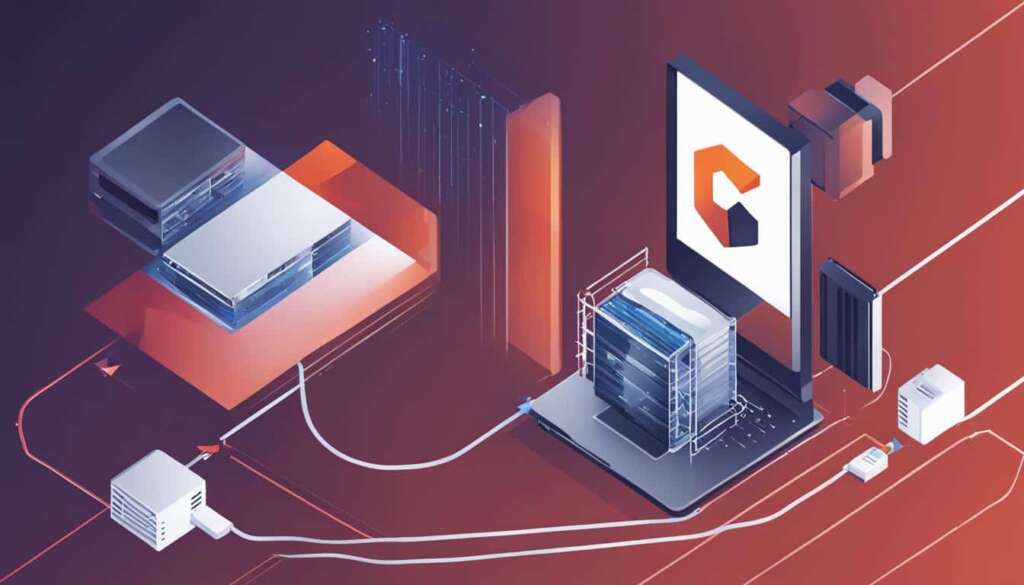Table of Contents
A web server is a crucial component in the functioning of the internet and plays a vital role in website access and management. To grasp the basics of web servers, it’s important to understand their purpose and how they facilitate the exchange of data.
A web server is essentially a computer or a combination of hardware and software responsible for storing and delivering website files. These files include HTML documents, images, CSS stylesheets, and JavaScript files that make up a website. The web server connects to the internet and enables the transfer of data between devices connected to the web.
The core of a web server is its HTTP server software. This software understands web addresses (URLs) and the HTTP protocol used by web browsers to view webpages. When a browser needs a file from a web server, it sends an HTTP request to the server’s HTTP server. This server then locates the requested file and sends it back to the browser via HTTP, allowing the browser to display the website.
Web servers are indispensable for website functionality, as they form the backbone of website access and management. Without a web server, websites wouldn’t be accessible to users and wouldn’t be able to deliver the content that users interact with.
Hardware and Software Components of a Web Server
A web server consists of both hardware and software components that work together to facilitate website hosting and data delivery. The hardware component of a web server is a dedicated computer designed to host web server software and store website files. This computer is connected to the internet, enabling the exchange of data with other devices.
On the software side, a web server is comprised of various components that control the access and delivery of hosted files. One of the key software components is the HTTP server, which plays a crucial role in processing and responding to incoming requests made by web browsers.
A web server can be classified as either static or dynamic. A static web server is relatively straightforward, consisting of a computer with an HTTP server that sends files as-is to the browser. This means that the content remains the same each time it is requested by the browser.
In contrast, a dynamic web server involves additional software components, such as an application server and a database. These components allow for the customization and updating of content before it is delivered to the browser. This enables dynamic web pages that can display personalized or real-time information based on user interactions or other factors.
Did you know? A dynamic web server can generate webpages on-the-fly using server-side programming languages like PHP, Python, or Ruby. This allows for more interactive and data-driven web experiences for users.
Hardware and Software Components Overview:
| Component | Description |
|---|---|
| Hardware | A dedicated computer that hosts web server software and stores website files, connected to the internet for data exchange with other devices. |
| Software | Includes an HTTP server, the main component responsible for processing and responding to browser requests. Additional software components may be present in dynamic web servers, such as application servers and databases. |
| Static Web Server | Consists of a computer with an HTTP server that sends files as-is to the browser. |
| Dynamic Web Server | Involves additional software components, such as an application server and a database, to update and customize content before delivering it to the browser. |
Different Uses and Types of Web Servers
Web servers play a crucial role not only in hosting websites but also in performing a variety of other functions. One such function is handling email communications through SMTP (Simple Mail Transfer Protocol). Web servers equipped with email server capabilities enable businesses to manage their email communications efficiently and securely.
Another essential use of web servers is facilitating file transfers through FTP (File Transfer Protocol). With a dedicated file transfer server, users can securely upload and download files, allowing for seamless sharing and collaboration between individuals or within organizations.
Web servers also play a vital role in web hosting, which involves storing and managing data for websites and web-based applications. Whether it’s a personal blog or a large-scale e-commerce platform, web hosting relies on robust web server infrastructure to ensure reliable and uninterrupted access to the hosted content.
When it comes to the types of web server software available, there are several popular options to choose from. Among them, Apache HTTP Server stands out as a widely used and highly respected web server. Known for its stability and versatility, Apache is a free and open-source solution that powers a significant portion of the internet.
Another notable web server software is Microsoft Internet Information Services (IIS), developed by Microsoft for their platforms. With its seamless integration with Windows Server, IIS offers a comprehensive solution for hosting web applications and implementing various Microsoft technologies.
Nginx is another top web server software known for its lightweight, high-performance design. Not only does Nginx excel at static and dynamic content delivery, but it also handles concurrent connections efficiently, making it a popular choice for high-traffic websites.
Other noteworthy web server software includes Lighttpd, Sun Java System Web Server, and IBM’s family of Domino servers. The choice of web server software depends on factors such as operating system compatibility, server-side programming capabilities, security features, and the specific needs of the website or application.
FAQ
What is a web server?
A web server is a computer or combination of hardware and software that plays a crucial role in the functioning of the internet and supports website access and management.
What are the basics of web servers?
Web servers act as storage and delivery systems for website files, including HTML documents, images, CSS stylesheets, and JavaScript files. They connect to the internet and facilitate the exchange of data with other devices connected to the web.
What is the role of web servers?
Web servers enable the exchange of data with other devices, respond to HTTP requests made by web browsers, and deliver requested files back to the browser via HTTP. They are essential for website functionality.
What are the hardware and software components of a web server?
A web server consists of dedicated computer hardware that hosts web server software and stores website files. On the software side, it includes an HTTP server and can be either static or dynamic.
What is an HTTP server?
An HTTP server is responsible for processing and answering incoming requests made by web browsers. It understands web addresses (URLs) and the HTTP protocol used by browsers to view webpages.
What is the difference between a static and dynamic web server?
A static web server sends files as-is to the browser, while a dynamic web server includes additional software, such as an application server and a database, to update and customize the content before delivering it to the browser.
What are the different uses of web servers?
Web servers not only host websites but also perform functions such as handling email communications through SMTP, facilitating file transfers through FTP, and supporting the building and publishing of webpages.
What is web hosting?
Web hosting involves storing and managing data for websites and web-based applications. Web servers play a crucial role in web hosting.
What are the top web server software?
The top web server software includes Apache HTTP Server, Microsoft Internet Information Services (IIS), and Nginx. Other notable web servers include Lighttpd, Sun Java System Web Server, and IBM’s family of Domino servers. The choice of web server depends on factors such as compatibility, programming capabilities, security features, and specific needs.













